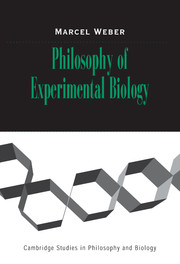Book contents
- Frontmatter
- Contents
- Preface
- Acknowledgements
- 1 Introduction
- 2 Reductionism and the Nature of Explanations
- 3 Discovery: Solving Biological Problems
- 4 Scientific Inference: Testing Hypotheses
- 5 Experimental Systems: A Life of Their Own?
- 6 Model Organisms: Of Flies and Elephants
- 7 Reference and Conceptual Change: Out of Mendel's Garden?
- 8 Developmental Biology and the Genetic Program: Explaining Ontogeny
- 9 Scientific Realism: In Search of the Truth
- Notes
- Bibliography
- Index
3 - Discovery: Solving Biological Problems
Published online by Cambridge University Press: 08 July 2009
- Frontmatter
- Contents
- Preface
- Acknowledgements
- 1 Introduction
- 2 Reductionism and the Nature of Explanations
- 3 Discovery: Solving Biological Problems
- 4 Scientific Inference: Testing Hypotheses
- 5 Experimental Systems: A Life of Their Own?
- 6 Model Organisms: Of Flies and Elephants
- 7 Reference and Conceptual Change: Out of Mendel's Garden?
- 8 Developmental Biology and the Genetic Program: Explaining Ontogeny
- 9 Scientific Realism: In Search of the Truth
- Notes
- Bibliography
- Index
Summary
The topic of this chapter is how biologists generate new theories, hypotheses, and explanations. This activity appears to be a form of reasoning, and reasoning is a traditional topic for philosophical inquiry. Some philosophers have referred to the process of generating theories as “discovery.” This is a misnomer because theories are not discovered. Even though we hear sometimes that Darwin “discovered” the theory of evolution, or that Einstein “discovered” relativity theory, this notion is highly problematic. The reason is that this way of talking presupposes that these theories somehow preexisted the work of Darwin or Einstein. But surely, this is nonsense. Although we could say, perhaps, that the law or mechanism of natural selection preexisted Darwin's work, or that the equivalence relation of mass and energy expressed by Einstein's famous equation E = mc2 preexisted Einstein's formulation of it, it makes no sense to say that Darwin's or Einstein's theories preexisted the scientific work of these men. To claim that they did would amount to some form of Platonism, according to which ideas exist independently of human thought. If we reject Platonism, we cannot meaningfully say that theories are discovered. Theories are indeed constructed by the creative activity of the human mind. The kinds of reasoning possibly involved in this constructive, creative activity are what the present chapter is about.
The question of how biologists generate new theories has recently been established as a subject for philosophical inquiry (Darden 1991; Schaffner 1993, Chapter 2).
- Type
- Chapter
- Information
- Philosophy of Experimental Biology , pp. 51 - 87Publisher: Cambridge University PressPrint publication year: 2004

